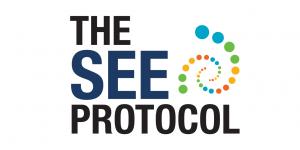Study Explores Breath Length in Bhramari Pranayama and its Impact on Relaxation
Recent research adds new insights about the inhale-to-exhale ratio during humming (Bhramari) to maximize its stress-buster capability
AHMEDABAD, GUJARAT, INDIA, February 27, 2024 /EINPresswire.com/ -- A new study published in the International Journal of Yoga1 provided insights into the ancient yogic practice of Bhramari pranayama, a breathing technique known as humming-bee breath. As against the previous beliefs, the study reveals that more extended breaths or louder sound vibrations may not necessarily enhance the relaxation benefits of Bhramari Pranayama. While performing Bhramari Pranayama yoga, a humming sound is produced at exhalation, resembling a bee's buzzing. The description in Hatha Yoga Pradipika explains that the inhalation is quicker while exhaling slowly and softly, humming like a female bee.
The study, which included 118 participants, explored the effects of four breath lengths – 8, 10, 12 and 14 seconds – during Bhramari Pranayama. Surprisingly, the researchers discovered that the maximum Heart Rate Variability (HRV), indicating optimal relaxation, occurred not at the expected 10 seconds but between 12 and 14 seconds of breath length.
Dr Gunjan Y Trivedi, the study's lead author, said, "Our research focused on heart rate variability, a key indicator of the balance between the sympathetic and parasympathetic nervous systems. Traditionally, longer breaths in yoga are associated with promoting parasympathetic dominance, leading to relaxation, but we specifically examined how different breath lengths in Bhramari impact HRV. The findings underscore the unique influence of humming on the nervous system. It suggests an optimal resonance point within longer breath lengths during Bhramari Pranayama, further activating the parasympathetic response.”
The study showed that longer breaths aren’t always better for relaxation during Bhramari Pranayama and that optimal breath length for maximising HRV and relaxation lies between 12 and 14 seconds. The study also showed that humming might create a unique resonance effect within longer breaths, further enhancing parasympathetic activation. However, more research is needed to personalise Bhramari Pranayama’s practice and explore its therapeutic applications.
The discovery opens up exciting possibilities to use the Bhramari Pranayama practice to maximise its stress-reducing and relaxation benefits. It also paves the way for further research on the therapeutic potential of humming and other yogic breathing techniques in various populations.
The study's co-authors include renowned diabetologist Dr Banshi Saboo, Dr S Kathirvel, Associate Professor at Postgraduate Institute of Medical Education and Research, and Dr Kamal Sharma, Chief of Interventional Cardiology at SAL Hospital, Ahmedabad. Published last year, their previous work focused on the role of Bhramari Pranayama as a stress-buster and the role of HRV in metabolic syndrome and disease.
The study adds a new layer to understanding the intricate relationship between breath, sound and nervous system regulation. With further exploration, humming could become a powerful tool for managing stress, promoting well-being, and unlocking the full potential of yogic breathing practices.
About Society for Energy & Emotions (SEE), Wellness Space2
The Society for Energy & Emotions at Wellness Space aims to transform individuals and teams using evidence-based techniques. They work to understand and address issues such as anxiety & depression, CPTSD (Complex Post Traumatic Stress Disorders), and childhood trauma (using inner child integration therapy) and have studied several intervention methods, including the SEE Protocol for Self-Hypnosis (active meditation practice) that includes Bhramari. They train psychologists and psychotherapists in evidence-based regression therapy, a psychotherapy training covered in six modules3.
Dr Gunjan Y Trivedi
Wellness Space
+91 95747 42288
info@wellness-space.net
Visit us on social media:
Facebook
LinkedIn
Instagram
YouTube
1 https://pubmed.ncbi.nlm.nih.gov/38204770/
2 http://www.wellness-space.net
3 https://wellness-space.net/one-year-online-program-regression-therapist-life-coach-certification/


